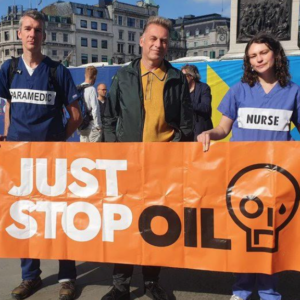Source >> Ecosocialist discussion
Yet, if the battering the Tories received in the recent by-elections tells us anything, it is that voters are totally fed up with Tory lies and corruption, their austerity and wage cuts, the running down of public services, from welfare to the NHS and public transport, and with a water industry that is pumping billions of gallons of raw sewage into our rivers and on to our beaches every year and desperately want a change.
In the Selby and Ainsty by-election, Labour overturned a 20,000-vote Tory majority with a 23.7-vote swing from the Tories to Labour—the second-biggest such swing in by-election history. In Somerton and Frome, the Lib Dems overturned a 19,000-vote Tory majority with a massive 29-point swing from the Tories to themselves. Both of these results spell a Tory wipeout in the general election. In Uxbridge and South Ruislip, Labour fell just short of victory after a 6.5 swing to Labour, which is discussed below.
These votes were even more remarkable given that the Tories had played the race card as hard as they could throughout the campaign, with apparently little effect.
The conclusion that Starmer drew from them, however, was bizarre in the extreme. He concluded that what voters will actually want when it comes to the general election is not for Labour to offer a clear alternative, to protect the planet, to rebuild public services, to tackle poverty, to increase welfare benefits, or to give Britain a long-overdue pay rise, but more discredited Tory policies! You couldn’t make it up if you tried!
In fact, the closer he gets to number 10 Downing Street, the more he moves to the right and the more Labour policies he dumps, which has been almost on a daily basis in recent weeks. He dropped his promise to scrap tuition fees, for example, and he has even refused to pledge to reverse George Osborne’s indefensible two-child restriction on welfare benefits.
In fact, the closer he gets to number 10 Downing Street, the more he moves to the right and the more Labour policies he dumps, which has been almost on a daily basis in recent weeks.
He told the Observer on Sunday, July 16th, that “We can’t win power by spending.” ” Frankly, the left has to start caring a lot more about growth, about creating wealth, attracting inward investment, and kickstarting a spirit of enterprise,” because, he says, “It is the only show in town for those who dream of a brighter future.” Rather than being recapitalised, he says, public services will have to be “restructured” (i.e., paper over the cracks) rather than invested in, which is what the Tories have been doing ever since they have been in office.
With wildfires getting worse across Europe and beyond, he assured Loura Kuenssberg (on the same day) that despite all this, the environmental pledges he had made at last year’s Labour Party conference would remain in place, including his commitment to invest 28 billion a year on renewables and to decarbonise the national grid by 2030. There could be some initial delay with the £28 billion, but, as he said, it would all be invested within the 2030 deadline. It was a calculated lie, however. In fact, his retreat had already started in early June, when it became clear that high inflation and turbulent economic conditions were likely to continue until the general election and beyond. Since then, all talk about spending £28 billion a year on green investment has given way to what he and Rachel Reeves call their “non-negotiable fiscal rules”.
Since then, all talk about spending £28 billion a year on green investment has given way to what he and Rachel Reeves call their “non-negotiable fiscal rules”.
North Sea investment
This was in sharp contrast to the intervention he had made in January, when he told the World Economic Forum in Davos that if he won the next general election, he would refuse, from day one, to issue new permits for oil and gas extraction from the North Sea, since, he said, it would contradict Labour’s net zero carbon ambitions, which could only be achieved by a rapid transition to renewable energy.
It was the most radical environmental proposal he had made to date. If implemented, it had the potential to render North Sea oilfields obsolescent and hand the initiative to renewables. It reflected Boris Johnson’s decision (albeit in a parallel universe) to ban the manufacture of combustion-engine cars after 2030, which set the agenda for a rapid transition to EVs.
There was very little media reaction to this at the time. This changed, however, when Jonathan Ashworth, on behalf of the shadow cabinet, officially launched the policy on May 28th.
Rishi Sunak, who has been handing out new North Sea licences with great relish and dismantling the Tories own pathetic climate pledges, claimed that Starmer’s proposals would bankrupt the economy and cost thousands of jobs. It would, he said, only benefit Putin, and he accused Starmer of letting “the ecozealots” of Just Stop Oil write his energy policy—a theme that he raised repeatedly in Parliament.
A few days later, Gary Smith, the right-wing general secretary of the GMB, one of Britain’s biggest trade unions and the one most involved in the petrochemical industry, launched a tirade against the proposals. He told his union’s annual conference that the oil and gas industry needed “plans, not bans”, and he told Sky News that such policies were going to create a cliff edge with oil and gas extraction from the North Sea that would threaten his members jobs.
“There is a lot of oil and gas in the North Sea”, he said, “and the alternatives facing the country are that we either produce our own oil and gas—take responsibility for our own carbon emissions—or we are going to import more oil and gas.”
Starmer actually defended his proposals the following day. He told them that “change is coming” and that it can unsettle us. “But mark my words, on my watch, good jobs, union jobs, will be fundamental to that change… Our Green Prosperity Plan, like President Biden’s Inflation Reduction Act, is our plan for growth.”
His full speech can be found here. It was the last time that Starmer defended his North Sea proposals in that way.
On Friday, June 9th, Rachel Reeves, who has also never shown any serious interest in the environmental crisis and shows little sign of understanding it, told the Today Programme that Labour’s £28 billion a year green investment would indeed have to fully comply with her ‘non-negotiable’ fiscal rules, which might mean that it would be delayed.
Ed Miliband tweeted a few hours later that “Some people (sic) don’t want Britain to borrow to invest in the green economy. They want us to back down. But Keir, Rachel, and I (sic) will never let that happen. Britain needs this £28 billion-a-year plan, and that is what we are committed to.”
Rosebank
On June 18, the Sunday Times reported that Starmer had scandalously given the Norwegian oil giant Equinor, which had applied for a licence to exploit the Rosebank oil field to the west of Shetland, a personal assurance that an incoming Labour government would not stand in its way if the licence was granted.
Rosebank is the biggest undeveloped oil field in the North Sea, with reserves of up to 500 million barrels of oil or equivalents. It is almost triple the size of the controversial Cambo oil field, which drew widespread protests and opposition at COP 26 in Glasgow and was eventually suspended. Scientists have warned, however, that giving it the green light would make holding the global average temperature at 1.5 C above pre-industrial levels far more difficult.
While this was consistent with his policy that the ban would only apply from the day Labour took office, allowing it through blows a gaping hole in his policy before it has even started. The idea that Starmer had any obligation to make such a concession is ludicrous. He should either revise his policy or tell Equinor that he can give no assurances that Labour would honour its licence once in office, given its ecological impact.
Uxbridge and South Ruislip
The full extent of Starmer’s retreat on environmental policy, however, came in the wake of the Uxbridge and South Ruislip by-election, where the Tories had managed to hang on to the seat with less than a 500-vote majority after a 6.7 swing to Labour.
Sunak promptly claimed—unsurprisingly—that this result was due to Labour’s support for the Ultra-Low Emissions Zone (or ULEZ), which Sadiq Kahn is currently expanding into Greater London from Central London, where it has been in force for three years. The expansion will require drivers of the most polluting vehicles to pay a penalty of £12.50 a day to go into the zone (or use a less polluting vehicle) in order to reduce air pollution, which is currently at dangerous, and indeed illegal, levels.
This result, Sunak argued, provided a model around which the Tories could win the general election as well, i.e., if they watered down their own environment policies even more—policies that many Tories regard as ‘green crap’ anyway—and made opposition to Labour’s environmental policies the centre piece of their campaign. In other words, “stop the boats” has failed, so let’s try “stop the green crap”. Sunak insisted that he is still in favour of action on climate change, but any action taken will have to be “pragmatic and proportionate,” i.e., totally ineffective.
A few Tories opposed Sunak, Zac Goldsmith, for example, told the Independent that it would be “cynical and idiotic” to scrap climate and other environmental measures on the back of a single by-election result. The Daily Mail was on board, however, claiming that many ‘Tory grandees’ were warning Sunak that he had to “Go true blue… or face wipe-out.”
ULEZ was indeed a significant factor in the Uxbridge result, of course. This, however, was not because voters could not be won over to it or that it was difficult to defend—in fact, it was remarkably easy to defend—but because there was no attempt by the Labour campaign to defend the policy. In fact, the Labour candidate, far from defending ULEZ against the Tories, joined them in calling for the scheme to be halted. He told the Evening Standard that he had heard “heart-wrenching stories” from those who would not be able to afford to upgrade their cars or pay the £12.50-a-day charge when the ULEZ came in.
ULEZ was indeed a significant factor in the Uxbridge result, of course. This, however, was not because voters could not be won over to it or that it was difficult to defend—in fact, it was remarkably easy to defend—but because there was no attempt by the Labour campaign to defend the policy.
Sadiq Khan had no problem defending it. He pointed out that five million people in London would breathe cleaner air with less nitrogen dioxide pollution if the zone was expanded. He cited research from Imperial College, which estimated that between 3,600 and 4,100 premature deaths in London were in part due to poor air quality.
According to the Guardian, leading doctors and scientists have also warned politicians against watering down plans to expand city-wide schemes aimed at reducing traffic pollution levels linked to thousands of deaths each year. They urged politicians not to lose their nerve over plans to improve poor air quality, such as the expansion of the ultra-low emission zone in London, which they said were central to tackling “unacceptably high” levels of illness and child deaths, and called for more ambitious policies to reduce toxic air.
The campaigning group Mums for Lungs tells us that “There are clear associations between air pollution and a number of conditions, including heart and lung disease, respiratory conditions, dementia, miscarriage, stunted lung growth in children, teenage psychotic episodes, and reduced cognitive ability.”
Andrew Rawnsley (no less), who was highly critical of Labour’s stance on this, quoted a shadow cabinet member in the Guardian as saying “How on earth did we get to a place where a policy that saves hundreds of lives a year became a voter-loser?”
Yes indeed, and with knobs on.
Andrew Rawnsley (no less), who was highly critical of Labour’s stance on this, quoted a shadow cabinet member in the Guardian as saying “How on earth did we get to a place where a policy that saves hundreds of lives a year became a voter-loser?”
A dangerous game
Giving ground to today’s pro-car lobby, which opposes any restriction on car usage from ultra-low emission zones to Low Traffic neighbourhoods (LTN), is a dangerous game since they see any restriction of the right to drive highly polluting cars and vans as both a ‘woke’ conspiracy and an attack on their basic human rights.
They include far-right activists and climate deniers, such as Laurence Fox and his populist ultra-right Reclaim Party, along with various fascist and neo-fascist organisations and assorted petrol heads, who see any restriction on cars as an opportunity to whip up culture wars around the issue. This was the case in Oxford last year, where they mobilised over 2,000 far-rightists from around the country against the introduction of a local LTN. My contemporary article on this can be found here.
The main problem we face, however, is not Laurence Fox but Keir Starmer, who concluded from Uxbridge not that Labour needs to be far more effective in defending its environmental policies but that the Tories were right and that the scheme should be suspended, and by implication dropped, before the general election. Fortunately, Sadiq Khan has just, since the by-elections, seen off an attempt by five Tory London Boroughs to get the ULEZ expansion stopped by the High Court, which found it to be entirely legal. He is therefore in no mood to listen to Starmer about it.
The question arises, however, that if Starmer collapses in front of a Tory campaign against the extension of the ULEZ in London, how could he possibly deal with the opposition that will be mounted against the eco-pledges he made at the last Labour Party conference, which will be of a different order of magnitude?
How will he defend his proposal to spend £28 billion a year on renewable energy, for example, which is already under attack? How will he defend his proposal to decarbonise the national grid by 2030 and the measures that will be necessary to do so, such as doubling onshore wind capacity, quadrupling offshore wind capacity, and tripling solar capacity, all of which will be challenged by the right? The reality is that unless he changes course rapidly on all this, his proposals are already dead.
This would be a massive setback in the struggle to save the planet. For the past year, his proposals have represented a clear alternative to the Tories and a beacon of hope in terms of making big reductions in UK carbon emissions in the short time left to do so, both in terms of energy prices and emissions reduction.
Starmer’s conclusion, that environmental measures are vote losers, is frankly ludicrous. The planet is burning, and deadlines are approaching. People can see it. Young people, in particular, are desperate for proposals that will take climate change seriously, defend the ecosystems of the planet, and offer them a viable future. These measures were something the movement could build on.
Starmer’s conclusion, that environmental measures are vote losers, is frankly ludicrous.
Starmer must halt this disastrous retreat and start defending his proposals. He must ensure that his pledges go into the Labour general election manifesto in full, and in the meantime, pressure from both inside and outside of the Labour Party, urging him to stick to his pledges, should continue.
Art (54) Book Review (127) Books (114) Capitalism (68) China (81) Climate Emergency (99) Conservative Government (90) Conservative Party (45) COVID-19 (46) EcoSocialism (60) Elections (83) Europe (46) Fascism (62) Film (48) Film Review (68) France (72) Gaza (62) Imperialism (101) Israel (129) Italy (46) Keir Starmer (56) Labour Party (113) Long Read (42) Marxism (49) Marxist Theory (47) Palestine (182) pandemic (78) Protest (153) Russia (343) Solidarity (150) Statement (50) Trade Unionism (144) Ukraine (351) United States of America (139) War (370)
Latest Articles
- Stop Palentir looting NHSDave Kellaway reports from the Thursday 22nd protest at Palentir HQ against Labour giving them a massive NHS contract.
- Big tech as traffickersFrancisco Louçã analyses Big tech. Is it a new power of techno-feudal lords as Varoufakis argues or an oligarchy of data traffickers?
- Iran: Campism and the Erasure of TheocracyNew forms of campism are undermining internationalism. Simon Pearson discusses.
- Labour in office – the way forward for the left in BritainReflecting on Labour and the British left, Alan Thornett discusses the situation.
- Crude CapitalismTony Richardson reviews Crude Capitalism by Adam Hanieh Verso Books 2024






